Appalachia Used to Be a Democratic Stronghold Here s How to Make It One Again
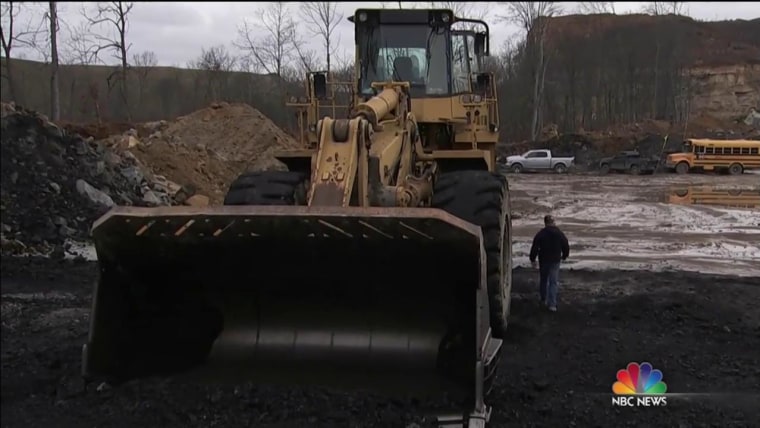
CHARLESTON, Westward.Five. — The American political landscape has changed a lot over the past 25 years but there is no more dramatic shift than the one that has pushed this state from deep blueish to ruddy ruby.
In the 1992 presidential election, Democrat Bill Clinton won West Virginia by a solid xiii percentage points. In November, Republican President-elect Donald Trump captured the country in a walk — winning it by more xl percentage points.
The forces behind that turnaround are complex. The decline of the coal industry and the changing demographics of the political parties explain part of it. Simply underneath that are the peaks and valleys of the Appalachian Mountains that make West Virginia what it is: picturesque, resource-rich and remote.
Coal has dominated much of the state'southward story, and the industry'southward declines are very real. Coal production in West Virginia has declined past 30 per centum since 2010 and, in that time, coal mine employment in West Virginia has fallen past more than 27 percent. Some places have been hit peculiarly hard.
In Boone Canton, a short drive from Charleston, the mining cuts have shattered the economy — more than than 4,000 jobs lost in the concluding v years, said Kris Mitchell, director of the Boone County Community and Economic Development Corporation. And that'southward in a county with only 24,000 people.
Coal production in the canton has dropped from 22,400 tons in 2010 to 8,400 in 2015.
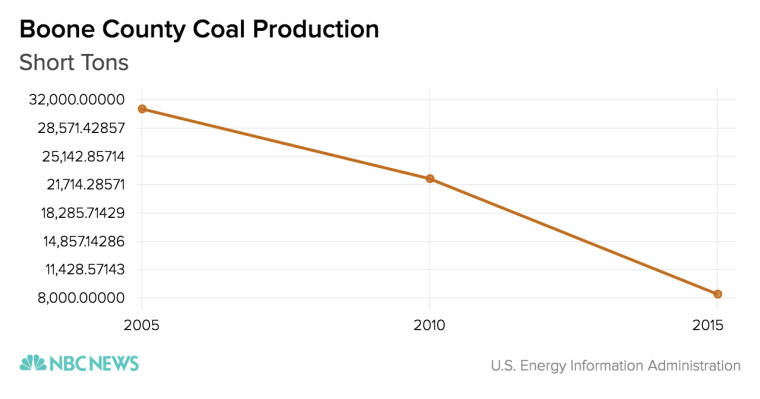
"Whether we like it or not, this place is forever inverse," Mitchell said.
And for a lot of people, the sources of those changes are clear: Democrats and environmental regulations.
President Barack Obama's plans to cut power plant carbon emissions by 30 percent impacted coal directly. Hillary Clinton'south electoral drubbing hither was driven in part by her hope to put "a lot of coal miners" out of work in pursuit of clean free energy. The words were pulled out of context, merely they fit into a narrative people here knew well.
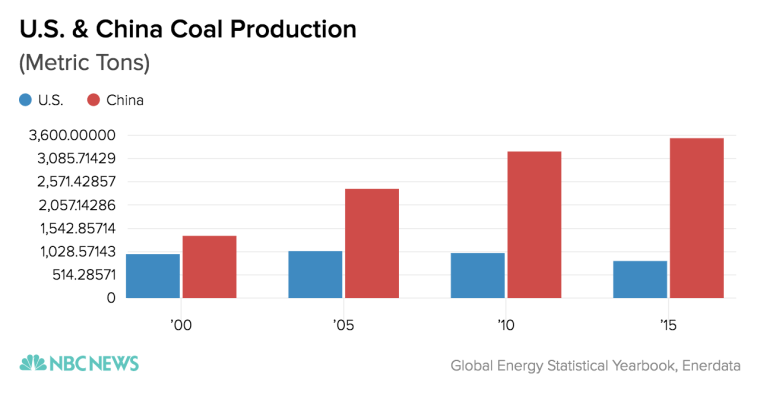
"When Obama offset got into office he said he was going to bankrupt the coal industry and he did. And he done information technology by regulation," said Steve Kennedy, who works at the Hobet Mine in Boone County. The site is existence reclaimed and, people hope, redeveloped. "I have an eighteen-twelvemonth-old son that graduated high school and he's working part time at UPS now but if that doesn't pan out, then he'll accept to exit here to find piece of work considering in that location's nothing hither."
Coal's struggles are not but about regulations, as officials and manufacture experts acknowledge. The booming natural gas marketplace and automation take also played major, arguably larger, roles. Voters, however, meet the Democrats as big drivers of the land's challenges.
Since 2010, West Virginia is the only state in the union that has lost population, according to the U.S. Census Agency. Its November unemployment rate, 6 percent, ranked 47th out of the 50 states.
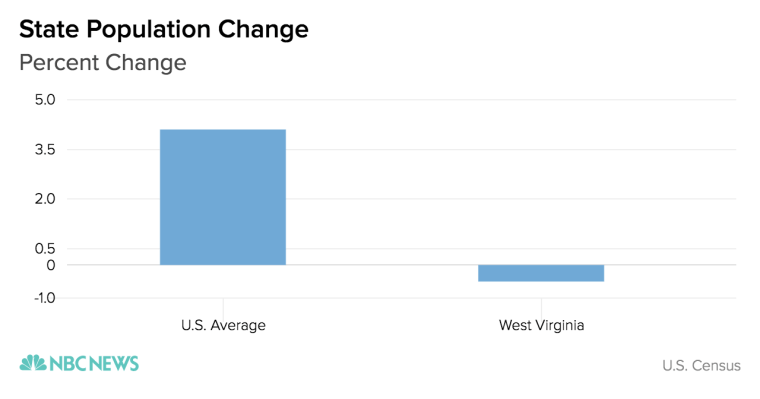
In a larger sense, though, Due west Virginia's political shift is about more than economics. It's most changes in the parties, the way the country's population views itself and the way it views Washington. So information technology's near civilization every bit much equally economic science.
Ask people in and around Charleston why the state has moved away from the Autonomous Party and one of the nigh common responses yous become is that the party has get likewise "liberal."
"The Democratic Party is in full retreat here now," said Mike Plante, a Democratic strategist in Charleston who's been in the state since 1992. Government, he said, is viewed as a tool of elites and a "malevolent forcefulness out to do us harm." And that'southward gotten worse under Obama, he added.

Trump was able to sew his massive margins, Plante said, because the president-elect knew how to talk to people in state who feel left out of the national chat. "Trump was telling a story," he said. "Trump was saying the elites are all looking downward their noses at you. 'I'm going to stick information technology to the people that stick it to yous.' … Due west Virginia is the butt of a lot of jokes and we feel that acutely here."
Plante'south bespeak is meliorate understood when you spend some time in the state and look at the demographic transformation of the Democratic Party.
West Virginia is one of the nation's almost rural states, with 77 people per square mile. Neighboring Virginia has more than 200 per foursquare mile. In that location are very few drives in West Virginia that follow straight lines. Roads wind around mountains and valleys, connecting pocket-sized dots on a map to one some other. Its population is more than 92 percent white.
Increasingly, the Democrats accept become the party of diverse, urban America. Its base is the nation's big cities.
When all the 2022 votes are in, Hillary Clinton is likely to win the national presidential pop tally by virtually iii million votes. That'south despite the fact that she's going to win the vote in merely about 500 of the nation's 3,100 counties. That means she won a lot of densely populated counties — places where life is very different than it is here and where the struggles of the coal industry have little personal impact.
And one of the Democrats' growing strengths, college graduates, are not a large role of W Virginia's population. Only 19 per centum of the developed population has a available'due south degree compared to nearly xxx per centum nationally. A common story effectually Charleston, even among those who say they love West Virginia, centers on college-educated children moving elsewhere to notice a job.
Is there a future for the Democratic Party in West Virginia? If in that location is, it may come through using government as a tool. Even equally voters say they distrust Washington, people nonetheless express a strong want for government spending — especially Trump supporters — for the roads and other infrastructure that can aid a place where private sector jobs are fleeing.
And whether residents like information technology or not, government makes up a big part of this state'due south economic fortunes. A full 19 percentage of those employed in the state work for some course of government — the public sector. That'south higher than the 14 percent who work for the public sector nationally.
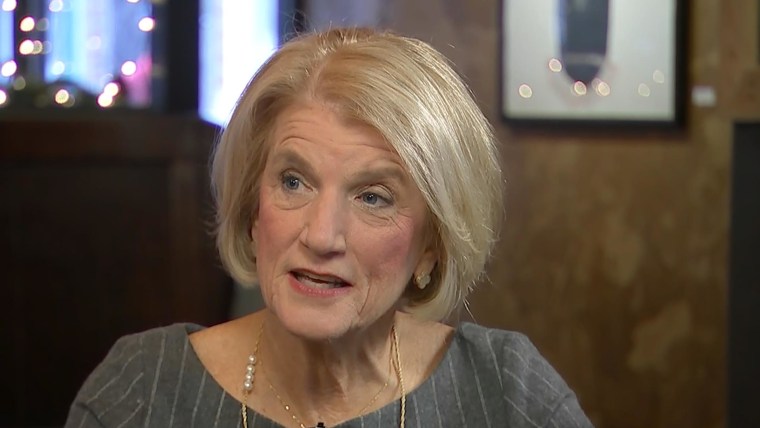
There's a history of government money flowing into W Virginia and a long list of buildings and structures named for the senator who once directed money to the state, Robert Byrd: from the Robert C. Byrd courthouses in Beckley and Charleston to the Robert C. Byrd Dark-green Bank Telescope in Light-green Bank.
And even after all the cuts in government, West Virginia still ranked ninth in federal spending per capita in 2022 at $11,973 per person. The federal funds spigot even so flows more freely hither than other places.
But the dissever between West Virginia and the Democratic Party runs deeper than all those elements. The economic divide is a demographic and cultural chasm. And sitting in Charleston, information technology looks all simply impossible to shut right now.
Source: https://www.nbcnews.com/meet-the-press/west-virginia-how-bluest-state-became-reddest-n697491
0 Response to "Appalachia Used to Be a Democratic Stronghold Here s How to Make It One Again"
Post a Comment